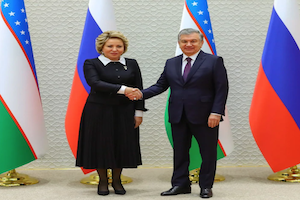History Repeats Itself: Uzbekistan's New Eurasian Gamble
By Farkhod Tolipov
November 22, 2019, the CACI Analyst
During an official visit to Tashkent on October 2, 2019, the Speaker of the Federal Council of the Russian Federation, Valentina Matvienko, stated that Uzbekistan’s President Shavkat Mirziyoyev had decided to resolve the question of Uzbekistan’s membership in the Eurasian Economic Union (EEU). If Tashkent actually decides to join, this will be the most dramatic and fateful geopolitical turn in Uzbekistan’s post-Soviet history, since it will signify the transformation of a non-Eurasian country to an Eurasian one. This is, indeed, a moment of truth for Uzbekistan and its foreign policy since it will require public support and a clear explanation of the country’s national interests.

Government reshuffle in Armenia
By Armen Grigoryan
October 21st, 2016, The CACI Analyst
Armenia’s President Serzh Sargsyan has reshuffled the government only months before the general elections, after which the presidential system will be replaced with a parliamentary one. The new appointments seemingly aim to ensure the continued rule of the Republican Party of Armenia (RPA) after next year’s elections. The current foreign policy course based on loyalty to Russia and its Eurasian project will likely remain unchanged, despite its dire economic consequences.
Kazakhstan's history as a geopolitical battlefield
By Dmitry Shlapentokh
May 27th, 2016, The CACI Analyst
Throughout 2015, Kazakhstan celebrated the 450th anniversary of what it regards as the beginning of its statehood as a major national event. This extraordinary interest in a seemingly academic subject had clear political undertones: Kazakhstan is not an “artificial” state, as sometimes proclaimed by representatives of the Kremlin. The country’s continuous process of distancing itself from Russia has been coupled with repression against suspected proponents of separatism in Northern Kazakhstan, populated by considerable numbers of ethnic Russians or Russian-speakers. Despite the existence of clearly pro-Russian attitudes in this region, Moscow has not supported them out of fear that it could raise extremist forms of nationalism in Russia, which would be highly problematic for the Kremlin.
Moscow's agenda in Central Asia and the Caucasus: it is official
By Richard Weitz
March 18th, 2016, The CACI Analyst
The states of Central Asia and the South Caucasus are in for a rough ride if recent Russian national security documents and speeches genuinely represent the Kremlin’s worldview. Not only do these texts veto their membership in NATO, but they exclude mutually profitable partnerships for these countries with the European Union and other Western institutions, constrain their domestic development, and encourage the suppression of civil liberties by warning of fictitious Western plots to change their regimes under the guise of democracy promotion and human rights.
Russia's missile launches and the militarization of the Caspian Sea
By Huseyn Aliyev, Emil A. Souleimanov
November 23rd, 2015, The CACI Analyst
In early October, Russia's Minister of Defense Sergei Shoigu announced that Russian navy warships based in the Caspian Sea had fired a total of 26 missiles at the positions of the terrorist organization calling itself the Islamic State (ISIS) in Syria. The minister claimed that all the 11 targets, located around 1,500 kilometers from the warships, were destroyed over two days. Russian authorities and pro-regime media have considered the strikes a big success. While information soon resurfaced that some cruise missiles had landed on Iranian soil, the fact that the October strike is definite proof of the failed attempts to turn the landlocked water basin into a demilitarized zone has received less attention.






